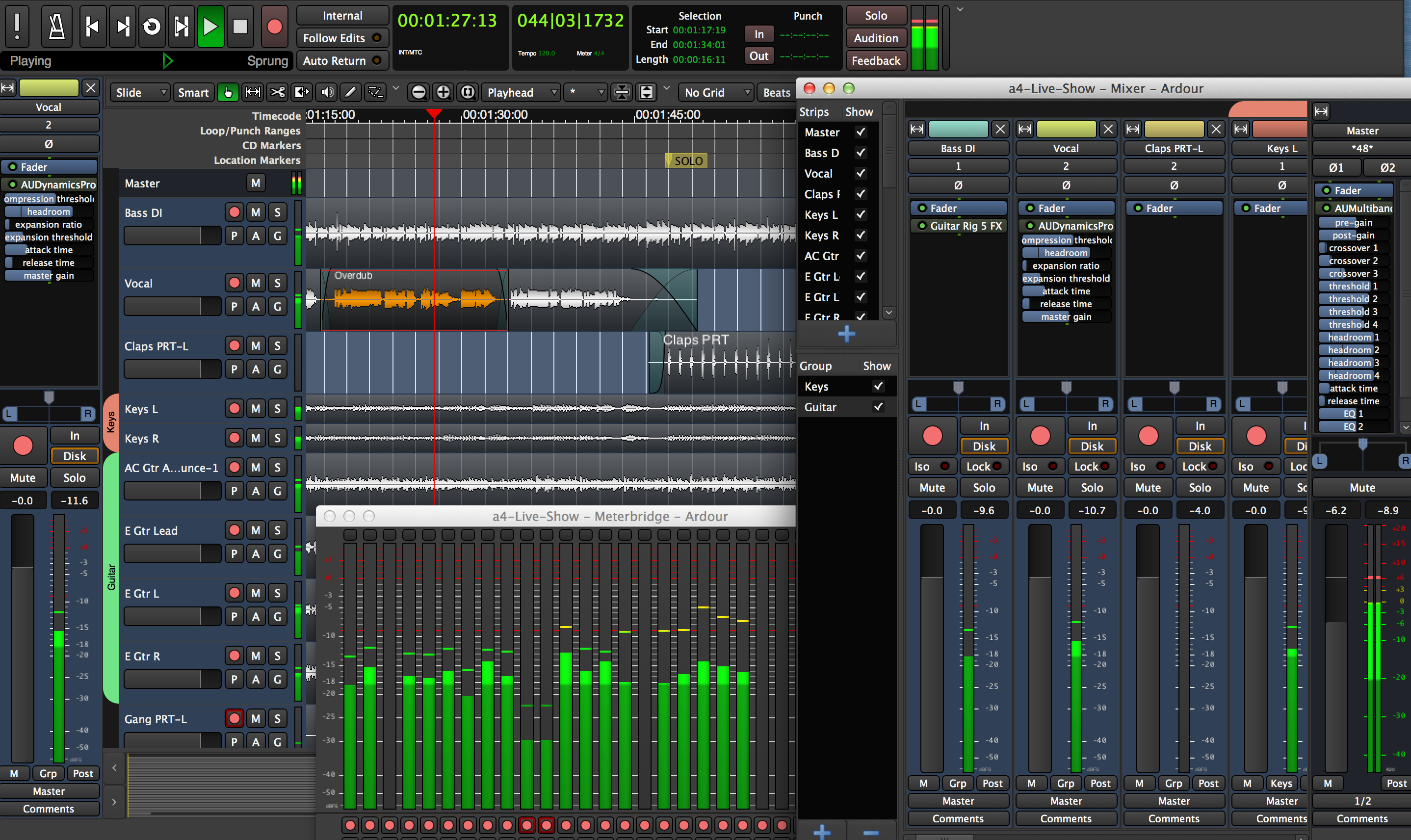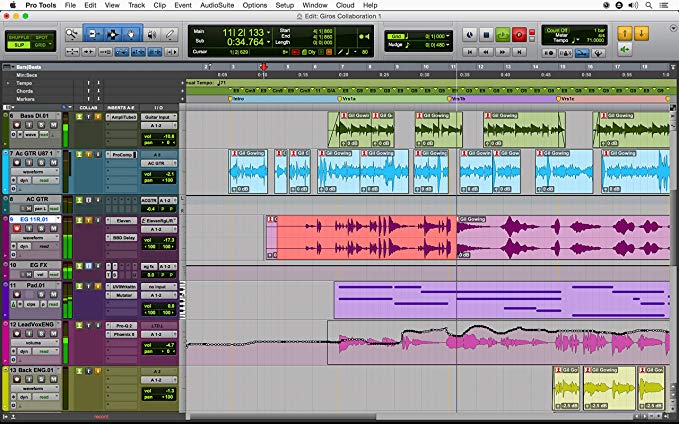Music recording software is a tool used to create and produce music digitally. It enables musicians, composers, and producers to record, edit, and mix audio tracks using their computers or mobile devices.
With this software, they can record, produce, and distribute music worldwide seamlessly. In today’s world of fast-paced technology, music recording software has become an essential part of creating and recording music. It has opened up a new world of possibilities to music producers and musicians alike.
This software is accessible to anyone with a computer and can be used to record, edit, and produce music in a variety of genres. Furthermore, it allows for experimentation and exploration of new sounds and techniques that were previously impossible with traditional recording methods. Music recording software has forever changed the way we create and enjoy music.

Credit: www.digitaltrends.com
Types Of Music Recording Software
Music recording software is software used to record and produce music. There are many types of music recording software, ranging from basic recording software to professional recording software. These software differ in features, price, and complexity, but all of them are designed to help musicians and producers create high-quality recordings.
Music recording software has become a crucial tool for musicians and sound engineers to record, edit, and produce music. With the advancement of technology, there are various types of music recording software that cater to different levels of expertise and purposes. Generally, music recording software can be divided into two types: basic audio recording software and advanced digital audio workstations (DAW).
Basic Audio Recording Software
Basic audio recording software is usually simple, user-friendly software that enables users to record and edit simple audio tracks. This type of software is suitable for beginners or those who only need to create simple audio recordings. Some notable basic audio recording software includes:
- Audacity
- GarageBand
- Ocenaudio
- Ableton Live Lite
Advanced Digital Audio Workstations (daw)
Advanced digital audio workstations (DAW) are professional-level software that offer a vast range of features and tools that cater to the needs of professional sound engineers and producers. This type of software usually has a steeper learning curve and requires more technical expertise. Some notable advanced digital audio workstations (DAW) include:
- Pro Tools
- Logic Pro X
- Ableton Live
- FL Studio
Music recording software has revolutionized the music industry and has made it accessible for anyone to record and produce high-quality music. Whether you are a beginner or a professional, there is music recording software suitable for your level of expertise.
Features Of Music Recording Software
Music recording software is designed to record, edit, and mix music tracks. It offers various features such as multi-track recording, virtual instruments, effects, and automation. With music recording software, artists and producers can create professional-grade music from the comfort of their own homes.
Music recording software enables musicians to record, edit, mix and produce high-quality audio recordings. There are several essential features of music recording software that are crucial for making music, including multi-track recording, virtual instruments, audio effects and plugins, and MIDI compatibility.
Multi-track Recording
Multi-track recording is the ability to record multiple audio tracks simultaneously or separately. This feature is essential for recording live instruments or vocals and enables musicians to isolate the various sounds in the mix to adjust volume levels, add effects, or mute individual tracks. In short, multi-track recording provides greater control of the audio recording process and yields professional results.
Virtual Instruments
Virtual instruments refer to software plugins that generate sound based on MIDI input. These instruments can mimic a wide range of acoustic and electronic instruments, including pianos, drums, guitars, and synthesizers. Virtual instruments can produce high-quality sound, and with advances in technology, they are becoming increasingly realistic, allowing musicians to create tracks that sound incredibly lifelike.
Audio Effects And Plugins
Audio effects and plugins add depth and character to music recordings. These features allow musicians to manipulate an audio signal, enhancing it with effects such as reverb, delay, chorus, or other creative effects. Plugins, in particular, are an essential feature of music recording software, as they allow third-party developers to add new features and effects, pushing the envelope of what is possible.
Midi Compatibility
MIDI (Musical Instrument Digital Interface) is a protocol used for communicating musical information between devices, including digital audio workstations (DAWs), synthesizers, and other hardware. With MIDI compatibility, musicians can control the virtual instruments and effects within their DAW, giving them greater control over their music production. By sending MIDI messages to the software, musicians can adjust pitch, tempo, volume, and more, making music production a creative and collaborative process. In conclusion, music recording software has revolutionized the way musicians create music. With features like multi-track recording, virtual instruments, audio effects and plugins, and MIDI compatibility, musicians can produce high-quality recordings without the need for expensive studio equipment.
Popular Music Recording Software Programs
Music recording software is a digital tool that enables producers to record, edit, and produce high-quality audio tracks. From Pro Tools to Ableton Live, music recording software programs have become increasingly popular in the music industry. These programs not only simplify the recording process but also allow producers to create complex arrangements and effects on their tracks.
Popular Music Recording Software Programs Music recording software programs have been a game-changer for the music industry, particularly for music producers, sound engineers, and musicians. The popularity of music recording software has led to the development of different programs, each with unique features. Here are some of the popular music recording software programs that are commonly used by musicians, producers, and sound engineers. H3: Pro Tools Pro Tools is a well-known and widely used music recording software program for its advanced and user-friendly features. From recording to mixing and mastering, Pro Tools has got all the essential tools to produce high-quality music recordings. It’s best suited for professional music studios, making it a popular choice for music production and sound engineering. H3: Logic Pro Logic Pro is an exclusive music recording software program for Apple users. Its advanced features and user-friendly interface make it a popular choice for music producers and sound engineers. Logic Pro offers various tools for audio editing, mixing, and mastering, making it an all-in-one music production software. H3: Ableton Live Ableton Live is a program designed for electronic music production, live performance, and DJing. Its unique features allow for on-stage music creation and improvisation, making it the go-to software program for electronic music producers and live performers. H3: FL Studio FL Studio is a music production software program designed for musicians who want to create high-quality music recordings. Its user-friendly interface and comprehensive tools enable musicians to produce professional-sounding music recordings. FL Studio is popularly used by electronic music producers and hip-hop artists. H3: Cubase Cubase is a comprehensive music production software program developed by Steinberg. It is widely used by music producers, composers, and sound engineers for recording, editing, mixing, and mastering music. Cubase offers various tools for MIDI sequencing, audio editing, and mixing, making it an all-in-one music recording software program. In conclusion, having a music recording software program is essential for music producers, sound engineers, and musicians who want to create high-quality music recordings. These popular music recording software programs have unique features and tools that cater to different music production needs.

Credit: ardour.org
How To Choose The Right Music Recording Software For You
Music recording software is a tool that allows you to record and produce music on your computer. With numerous options available in the market, it can be challenging to choose the right software for you. Factors that can influence your decision include your budget, level of experience, and preferred features.
How to Choose the Right Music Recording Software for You In today’s world, music recording software has become an essential tool for every musician or music producer. The right software makes all the difference in capturing high-quality sounds, mixing and editing tracks, and producing professional-sounding music. However, with so many options available in the market, it can be quite overwhelming to select the right music recording software for your needs. In this article, you will learn how to choose the right music recording software by considering your budget, assessing your needs, researching and reading reviews.
Consider Your Budget
The first thing you should do when looking to invest in music recording software is to consider your budget. Recording software can range from free to high-end software worth thousands of dollars, so it’s essential to know how much you’re willing to spend. While free software might seem like a good deal, keep in mind that the features and functionality might not be as good as paid software. If you’re just starting, it’s best to start with some free software to understand recording basics, but if you’re serious, investing in professional software is necessary.
Assess Your Needs
After considering your budget, assess your needs next. Understand what features you require in your software for producing the music you want to make. For instance, if you’re an electronic musician, you might need a synthesizer or drum machine built into the software or plug-ins that can help you produce certain sounds. Ensure the software you choose has all the necessary features and tools you need to produce your desired sound.
Research And Read Reviews
Before investing in music recording software, do thorough research and read reviews. Check various online forums, reviews from experts, and consumer reviews to determine the efficiency and reliability of the recording software. Reviews often highlight the strengths and weaknesses of a product, giving you an idea of what to expect. It would help if you considered both the audio quality of the software and the ease of use to determine the best software option for your music production needs. In conclusion, selecting the right music recording software can be challenging, but the process becomes easier by considering your budget, assessing your needs, and researching and reading reviews. Keep in mind that no music recording software is perfect, but selecting the right one can make all the difference in producing high-quality music.

Credit: producelikeapro.com
Frequently Asked Questions For What Is Music Recording Software
What Does Music Software Do?
Music software allows the user to create, edit, and manipulate music digitally using a computer. It includes features like recording, mixing, sound editing, and effects processing, enabling musicians and producers to create professional-quality music.
What Does Music Recording Do?
Music recording captures and stores sound that is performed by musicians, singers, and other audio performers using various recording technologies. It creates a permanent record of a musical performance that can be reproduced and shared with an audience. Music recording makes it possible to preserve and distribute musical compositions for commercial release, broadcasting, and personal enjoyment.
What Software Is Used For Music?
There are many software used for music production such as Ableton Live, Logic Pro X, FL Studio, Pro Tools, Garageband, Audacity, Cubase, and more. They have different features and tools for recording, editing, mixing, and mastering music to create professional-quality tracks.
Which Software Is Best For Audio Recording?
The best software for audio recording depends on your needs, budget, and skill level. Some popular options include Pro Tools, Logic Pro X, Ableton Live, FL Studio, and Audacity. Research and compare their features before choosing the one that suits you best.
Conclusion
Music recording software is brilliant in helping musicians and enthusiasts produce high-quality sound recordings with ease. With the right knowledge and a bit of experimentation, one can get creative with their music and produce their own unique sound. It’s important to choose the appropriate software that’ll best suit your needs and skillset, regardless of whether you’re a beginner or a professional.
Always remember that music recording software is a tool to bring your vision and creativity to life. So, let it inspire you to make your music dreams a reality!